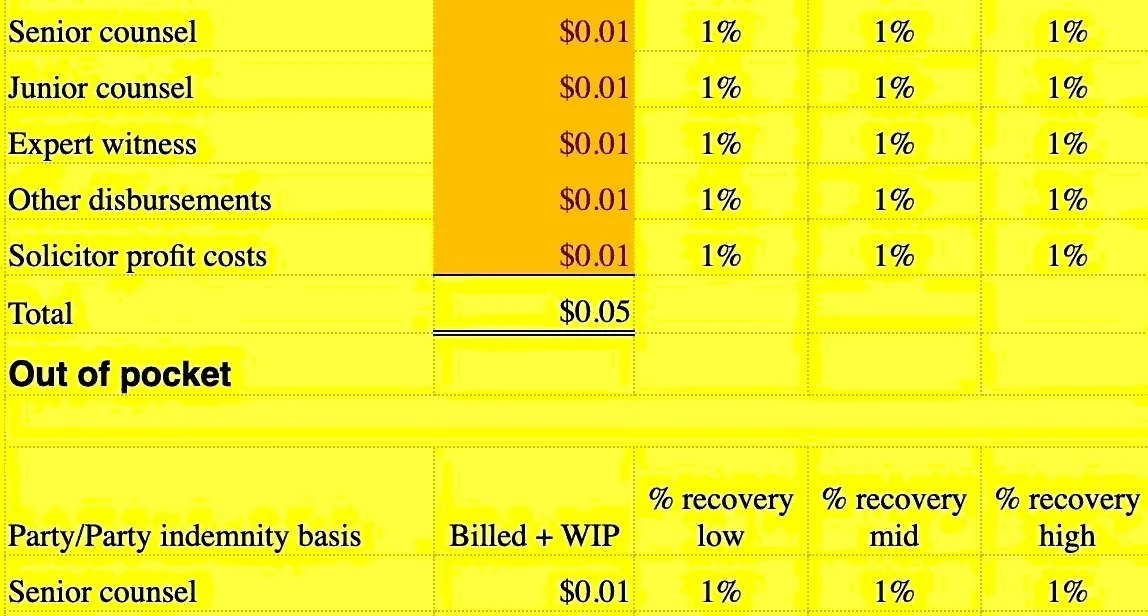Costs disclosure before settlement
Costs disclosure must be continuous
Too many lawyers wrongly believe the time to provide clients with an estimate of legal fees is when they start representation—and the estimate may then be forgotten. Too many lawyers wrongly believe clients are interested in estoppel, foreseeability, and other esoteric legal concepts—and lawyers forget about time and money.
Making costs disclosure is providing clients with an estimate of legal fees.
Section 169 of the Legal Profession Uniform Law states the objectives of costs disclosure. One objective is to ensure that clients can make informed choices about their legal options and the costs associated with pursuing those options.
Proper costs disclosure requires providing clients with an estimate of legal fees in such a way that it empowers clients to make informed choices about their legal options, including how much those options cost and when those costs will be incurred—time and money.
Legal options usually change. As they do, lawyers must be vigilant to refine and revise previous estimates to keep their clients empowered. And clients must understand that litigation is inherently unpredictable, so changing an earlier estimate is normal and proper practice.
Settlement is a legal option
Most civil litigation never goes to trial because a legal option almost always arises: settlement.
Settlement is sometimes called out-of-court settlement. This reflects the meaning of settlement: an agreement resolving a dispute without a judge giving a judgment.
In civil litigation, it is normal for persons in dispute to agree between themselves that a person(s) will pay another person(s) an amount of money, in return for the dispute ending. Such an agreement is known as a settlement.
Whether a person should settle, and if so, then for how much and on what terms, is normally the subject of legal advice.
Wrong legal advice about settlement can be professional negligence
In 2016 and 2017, the High Court considered the professional negligence of barristers and solicitors when advising on settlement of litigation. In the 2016 decision of Attwells & Anor v Jackson Lalic Lawyers Pty Ltd [2016] HCA 16 and the 2017 decision of Kendirjian v Lepore & Anor [2017] HCA 13, the court held that advocates’ immunity from suit did not extend to the advice given about a settlement offer. This was because such advice did not affect the judicial determination of the case. In other words, unhappy clients can sue lawyers for legal advice hastily given during morning tea in response to settlement negotiations during the trial.
These High Court decisions should surprise no one. Experienced solicitors and barristers all know the importance of documenting advice given to clients and getting their clients to sign the documents. Even before these High Court cases, professional conduct committees regularly considered disciplinary complaints from aggrieved clients about settling cases for less than they were worth and the failure of their lawyers to guide them.
Costs disclosure before settlement is mandatory
Section 177 of the Legal Profession Uniform Law requires that if a law practice negotiates the settlement of a litigious matter on behalf of a client, then it must make special costs disclosure to the client before the settlement is executed. Two broad estimates are necessary:
the law practice must disclose a reasonable estimate of the amount of legal costs payable by the client, and
the law practice must disclose a reasonable estimate of any contributions towards those costs likely to be received from another party.
Broad estimate no.1 includes costs payable by the client to another party. So, this broad estimate concerns (a) legal costs payable by the client to their own lawyers, and (b) legal costs payable by the client to another party.
Option (a) applies whether the client wins or loses. Option (b) applies when the client loses.
Broad estimate no.2 concerns legal costs payable to the client from another party. This applies when the client wins.
Estimates vary with the basis on which costs are calculated. Two common bases are “on an ordinary basis” and “on an indemnity basis”. Often, estimates calculated on an ordinary basis are significantly less than estimates calculated on an indemnity basis.
Offers to settle can affect the basis on which costs are calculated.
Proper disclosure requires a long list of calculations
Complying with section 177 of the Legal Profession Uniform Law requires providing clients with an estimate of legal fees in such a way that clients are empowered to make informed choices about their 3 legal options:
to settle
go to trial and win, and
go to trial and lose.
If offers to settle might affect the basis on which costs are calculated, then these 3 legal options require 6 calculations estimating costs:
if the case does settle
if the case does not settle, proceeds to final hearing, and the client wins
if the case does not settle, proceeds to final hearing, and the client loses
the fair and reasonable costs payable/received on a wholly ordinary basis
the fair and reasonable costs payable/received on a wholly indemnity basis, and
the fair and reasonable costs payable/received on a mixed ordinary and indemnity basis.
Failure to disclose has significant consequences
Section 178 of the Legal Profession Uniform Law partly regulates what happens when lawyers fail to give proper disclosure.
Sections 34 and 35 of the Legal Profession Uniform Law extend the operation of s.178. Sections 34 and 35 make each principal of a law practice in a position to influence the conduct of the law practice responsible for ensuring that reasonable steps are taken to ensure compliance with professional obligations and the Legal Professional Uniform Law.
Other provisions affect the operation of these sections.
Failure brings several unpleasant consequences:
the lawyer's costs agreement is void
the client need not pay the lawyer's legal costs until they have been assessed
when the legal costs are assessed, the assessment cost is paid by the lawyer
the lawyer must not commence or maintain proceedings to recover the legal costs until they have been assessed
if the lawyer has started costs recovery proceedings, then they may be dismissed, with the cost of the litigation paid by the lawyer
the lawyer's failure may constitute unsatisfactory professional conduct or professional misconduct
one lawyer’s failure may constitute unethical conduct by other solicitors, and
one lawyer’s failure may constitute unethical conduct by a law practice’s principals.
The “vibe” is not enough
When making these calculations, lawyers sometimes apply the Denuto Principle, made famous by the fictional solicitor Denis Denuto in the 1997 Australian film The Castle when addressing the Federal Court:
“In summing up, it’s the constitution, it’s Mabo, it’s justice, it’s law, it’s the vibe and aah no that’s it, it’s the vibe. I rest my case.”
The “Denuto Principle” seldom discharges professional obligations.
A quick, simple, better way
Equipped with a pre-law background as an industrial chemist specialising in quantum mechanics, a person comfortable with mathematics and technology, and someone who recognised human imperfection was universal (especially my own), I created a solution.
My solution emerged when I was briefed to advise on settlement of an appeal with a cross-appeal against the trial judge’s refusal to order indemnity costs. The client wanted to know whether they should accept an offer of compromise made during the appeal: Consolidated Lawyers Ltd v Abu-Mahmoud [2016] NSWCA 4.
My costs disclosure settlement computer is a Microsoft Excel spreadsheet designed for lawyers who don’t know how to use spreadsheets and who might be allergic to numbers.
With a little training, making the 6 calculations estimating costs set out above takes about 5–15 minutes.
And it’s free!
If you are a barrister or solicitor negotiating the settlement of a litigious matter on behalf of a client, download my costs disclosure settlement computer and the instructions.
Unusual cases require expertise
A companion tool for unusual cases
My free settlement computer is not designed for unusual cases.
Advising on settlement of an appeal with a cross-appeal against the trial judge’s refusal to order indemnity costs, when offers of compromise have been served during the proceedings below and on appeal, is an unusual case.
Seeking security for costs is an unusual case.
Unusual cases require expertise. Lawyers estimating costs in an unusual case should consider engaging a barrister or solicitor with expertise in costs law.
For them, I have a second version of the computer which, while looking superficially similar, is more sophisticated and designed to be used in the hands of a costs expert.
If you need more information, download my legal costs resume and make time to speak with me.

